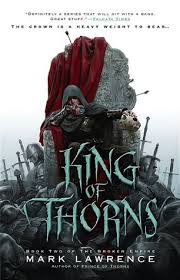
2‑King of Thorns
Chapter 2: Wedding day
by Mark, Lawrence,The chapter “Wedding Day” from *King of Thorns: Book Two of the Broken Empire* sets the stage for a pivotal moment in the narrative, though the provided excerpt is notably brief. The title alone suggests a significant event—a royal wedding—which likely carries political, emotional, or strategic weight within the broader story. Given the series’ dark and gritty tone, the wedding may not be a conventional celebration but rather a catalyst for conflict or power struggles.
Despite the lack of detailed content in the excerpt, the chapter’s title implies a turning point for the protagonist, King Jorg. Weddings in the Broken Empire universe often serve as alliances or traps, hinting at underlying tensions. The brevity of the excerpt leaves much to the imagination, but readers familiar with the series can infer that this event will test Jorg’s cunning, resilience, or moral boundaries, as is typical of his character arc.
The sparse nature of the chapter suggests a deliberate stylistic choice, perhaps emphasizing the abruptness or unpredictability of the wedding day itself. It may also serve as a narrative hook, drawing readers into the unfolding drama without revealing too much upfront. The Broken Empire series is known for its ruthless pacing and twists, so this chapter likely precedes significant upheaval or revelation.
In summary, while the excerpt is minimal, the chapter title “Wedding Day” signals a moment of high stakes in *King of Thorns*. Whether it unfolds as a political maneuver, personal trial, or violent confrontation, it aligns with the series’ themes of power, betrayal, and survival. The absence of detail only heightens anticipation for the events to come.
FAQs
1. What is the significance of the title “King of Thorns” in relation to the chapter’s content?
Answer:
While the chapter content provided is minimal, the title “King of Thorns” suggests a thematic focus on power, pain, and the burdens of leadership. In the context of the “Broken Empire” series, thorns often symbolize the harsh realities and sacrifices associated with ruling a fractured realm. The title implies that the protagonist, likely Jorg Ancrath, must navigate a path fraught with challenges, where his authority comes at a personal cost. This aligns with the series’ darker tone and exploration of morally complex governance.2. How does the sparse chapter content (simply the number “1”) contribute to the narrative or thematic structure of the book?
Answer:
The minimalistic presentation of just the numeral “1” could serve multiple purposes. It may represent a deliberate stylistic choice to create suspense or signify a pivotal moment—such as a countdown to a major event (e.g., a wedding or battle). Alternatively, it might reflect the protagonist’s fragmented perspective, mirroring the “Broken Empire” itself. The emptiness could also symbolize the isolation or existential weight carried by the king, emphasizing themes of solitude in leadership. Such brevity challenges readers to infer meaning beyond the text.3. If this chapter is titled “Wedding Day,” what potential conflicts or ironies might arise given the broader context of the “Broken Empire” series?
Answer:
In a world marked by violence and political treachery, a wedding day—typically a celebratory occasion—could become a stage for power struggles, betrayal, or even warfare. The irony lies in the juxtaposition of union and division: a wedding symbolizes unity, yet in the “Broken Empire,” alliances are often transactional or temporary. The king’s marriage might serve as a strategic maneuver rather than a romantic bond, inviting questions about loyalty and the price of stability. Additionally, the festivities could mask underlying tensions or serve as a target for enemies.4. How might the chapter’s lack of detailed content reflect the protagonist’s mindset or the world-building of the “Broken Empire”?
Answer:
The absence of detail could mirror the protagonist’s detachment or emotional numbness, a recurring trait in Jorg Ancrath’s character. Alternatively, it might reflect the barren, war-torn state of the empire itself—where even significant events are stripped of ceremony or hope. The sparse style forces readers to engage with the subtext, much like characters in the story must navigate a world where meaning is often obscured by violence and pragmatism. This technique reinforces the series’ grim atmosphere and unreliable narration.5. What narrative purpose might a single-digit chapter serve in a larger fantasy epic like “King of Thorns”?
Answer:
A single-digit chapter could act as a tonal pivot, marking a abrupt shift in pacing or perspective. In epic fantasy, brevity amid dense world-building can heighten tension—for example, signaling an imminent climax or a cryptic prophecy. It might also represent a “calm before the storm,” where silence amplifies anticipation. For a character like Jorg, whose decisions are often impulsive, the minimalism could mirror a moment of rare introspection or the stark finality of a choice that will reshape the narrative.
Quotes
1. “King of Thorns: Book Two of the Broken Empire”
This opening line sets the stage for the chapter, introducing the book’s title and series, which hints at the dark, regal, and fractured themes that will likely be explored.
2. “1”
While seemingly minimal, this numerical marker may represent a significant structural or thematic division in the chapter, suggesting a pivotal moment or the beginning of a new narrative thread.
